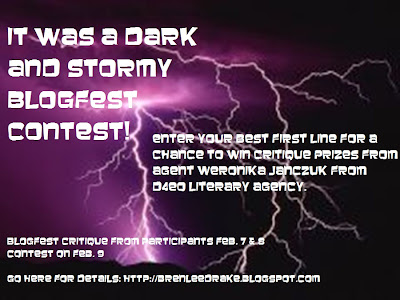
There’s only one week until It Was A Dark and Stormy Blogfest Contest judged by Weronika Janczuk on February 7-9. Click here to join in the fun (or just scroll down to the previous post, whichever). So, today I’m pleased to post my interview with Weronika for you all to get to know her better, which only made me more excited for the contest.

I’ve read that you’re a tea drinker and the lover of witty books. If you’re curling up on the sofa on a cold winter’s night, what tea are you drinking and which witty book is on your lap?
I’m addicted to Earl Grey, with a bit of sugar and a squeeze of lemon juice. As for a witty book, anything by David Sedaris (at this fine moment in time; it changes constantly).
Earl Grey is my fave too (promise I won’t stalk you, okay only on twitter here). So, you were a freelance editor and an intern before getting your agent gig at D4EO Literary Agency. How did those jobs prepare you for agenting?
I learned nearly everything there was to know before getting started. Some things you can’t learn without actually doing them, such as delving into the process of editing a book or compiling a submissions list; other things—such as how to read with an editorial/agenting eye (“Will this sell?” “What do we have to do to make this saleable?”), how to write a pitch letter, how to deal with contracts and royalty statements and payments, how to handle the publicity/marketing for clients, etc.—I learned from the variety of pre-D4EO gigs.
I agree. You can sit on the sidelines and take notes, but it’s not until you dive into the thick of it and get dirty do you learn the game. You’re a writer as well. What genre do you write in and how do you schedule time to write?
I write YA, literary and historical fiction; I’m currently working on a YA. (If you’re curious, I blog about the writing process here.) I don’t schedule time to write—I write whenever I have time, which means I have to be caught up with everything client-related and have enough of a buffer to leave queries or requested manuscripts for a day or two. I try to be expedient with everything on the agenting end, so writing comes after.
And I thought I was busy. You really have to juggle your time. Do you work closely with your clients on revisions before submitting a project to publishers?
Oh, yes. At least one round of revisions, most often multiple rounds—sometimes these revisions take months (and add to that the slowness of publishing; people wonder why it takes months to sell a book).
I can believe that, my revisions have taken. . . Well, anyway, what are the common mistakes you see writers make when querying you?
I don’t read queries. I jump into the pages—with those, it’s starting in the wrong spot; not completely clean writing; cliché scenarios; non-distinctive voice; etc.
Well, that’s encouraging to know for those who struggle with the query. Your blog says you represent adult fiction. Is there anytime you’d consider looking at representing young adult or middle grade fiction?
I am still especially looking for a romance, a thriller, a sci-fi, a horror, and some more women’s fiction, but I am always happy to take on great literary fiction, commercial fiction, non-fiction, and fantasy.
Great list, I hope you find some of that here in the contest. Since this is a first line contest, do you have any pointers on how to make a first line zing?
To answer this question entirely, I’d have to spend a lot of time analyzing why existing first lines work. Here are some general tips (and I warn you that there are always exceptions, but unfortunately, most writers aren’t the exception):
– It’s hard to put into words, but really good first lines are lively; they bring the story and the reader’s interest to life. Immediately from a first line a reader can sense that the writer has control over the unfolding story, so make sure that your decision regarding the first line is as calculated and purposeful as all decisions about a manuscript should be.
Wow, excellent tips. With your editor eye, what’s the biggest mistake you see in the full manuscripts that you pass on?
Sometimes I’m not sure what’s wrong—I just don’t want to keep reading. You have to invest the reader into the world and the characters so deeply that they won’t think twice about not finishing.
Yeah, that tension bit is hard to master. How would you describe your agent style? Do you have teeth like a shark or are you as soft as kitten or somewhere in between?
I’m not sure that I know what both ends of that spectrum look like. Like any good agent, I like to think that I am fiercely protective of my clients’ interests—their number one advocate in the office, when the book is going on submission, when it sells, when it comes to publicity/marketing efforts, etc. No good agent can be soft as a kitten in these situations, not when publishers are taking a long time to get contracts and payments out, etc.
Great insight on how you handle your business and how you know when you need to be tough or a bit softer. Thank you, Weronika! In closing, can you leave us with your favorite quote?
 |
| Enter Contest Here |
13 Comments
Kerri C at CK Farm · February 2, 2011 at 11:05 am
Great interview Brenda. Thanks Weronika! Great tips for those first lines. Can’t wait for the contest!
Elaine AM Smith · February 2, 2011 at 12:23 pm
That was an interesting insight.
Brenda, you have me researching the strongest hooks and revising the first sentence of my YA SF – ready for next week. I thought the opening was tighter than anti-thrombosis hose. Having read about 200 opening lines, this morning, I’m not sure of anything but my headache. 😉
Heather · February 2, 2011 at 12:31 pm
What an excellent interview! I love Weronika’s outlook on submission and her openness. She makes me wish I wrote adult novels! You two are an excellent match Brenda!
Melissa · February 2, 2011 at 1:54 pm
This is a fabulous interview! I didn’t know who Weronika was before this and now I do! Which is really awesome because she sounds fabulous (and honestly a bit like super woman!)
Kimberly · February 3, 2011 at 1:00 pm
What a great interview. I love hearing an agent’s perspective and the first line tips are now stored away in my brain.
I’m glad you explained how Weronica’s name was pronounced, I was doing it wrong. 🙂
Critique Sisters · February 3, 2011 at 5:42 pm
Brenda, you and Weronika are fantastic for putting this contest on! And the interview makes Weronika sound like a dream agent. Perhaps a few of the Sisters will enter…
The Blogger Girlz · February 5, 2011 at 1:38 pm
Thanks for the first line tips, and just in time for the contest.
– Aaron
Sharon K. Mayhew · February 5, 2011 at 10:13 pm
Great interview and thanks for the tips! Thanks for hosting such a great contest too. 🙂
Diana Paz · February 6, 2011 at 6:45 am
Thanks for the fantastic interview! The contest sounds great too 🙂
Brenda Drake · February 6, 2011 at 8:33 am
Thanks guys, it’s been great fun getting to know Weronika. I liked her a lot before the contest and now, if possible, I like her even more. She’d be a great agent to have in your corner. 😀
Jemi Fraser · February 6, 2011 at 4:43 pm
What an amazingly detailed interview! Lots of great tips and advice. Thank you! (from another Earl Grey fan :))
Donna Hole · February 7, 2011 at 12:11 am
Excelelnt interview. So detailed.
I’ve been looking forward to this interview, and go by so late b/c I’m having troubles getting your blog to come up on my site. I had link problems tonight in the text also.
If I don’t make it back for a while, its not from lack of trying 🙂
………dhole
erica m. chapman · February 7, 2011 at 5:13 pm
Great interview! Lots of fantastic info and insight ;o)
Thanks to both of you!!
Comments are closed.